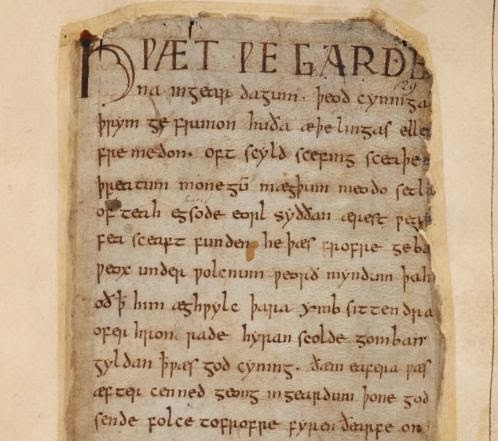You know what almost made it an even worse day for knowledge preservation? A codex in that library held the world's only existing copy of Beowulf, and that codex only barely escaped the flames [1]. That's right: Beowulf, the great English-language epic, tent-pole of high school English curricula, a (if not the) foundational work in English literature, reckoned by most post-Tolkien scholars as a masterpiece, was almost destroyed in a fire and lost. Forever. We were very nearly born into a Beowulf-less world.
Now, I don't know about you, but I find that idea utterly horrifying. Like, keep-me-up-at-night horrifying. It's not that I love Beowulf so much that the very thought of not having it to read puts me in a cold sweat (although, I'm in a Beowulf class right now and loving every minute of it[2], so I wouldn't put it past myself to feel that way come May). I do really, really like Beowulf, but I think my terror goes a little deeper than that.
What's truly disturbing for me about this whole story is that it illustrates the sad, humbling fact that no matter how hard we try to preserve it, humanity and its work are in a constant state of disappearing. Think mortality, but on a grand scale. Yes, I will die, and you will die, and everyone on Earth will one day die, and I think about that a lot; but something I only think of every once in a while (and maybe that's why it's so strikingly scary for me) is that all human art will die, too. It's like that part in The Hitchhiker's Guide to the Galaxy: Arthur Dent can cope with the idea that everyone in the world has died, but when he realizes that there is no longer McDonald's, he passes out cold. Film, literature, painting, music, and all that—a big part of the reason they exist is for posterity, that ability they have to outlast their creators and communicate with people far in the future. But what if a piece of art just doesn't last? Well, that's it, I guess. *passes out cold*
Just like everything else, art lives in this precarious state that is always just on the brink of dissolution. I think maybe the ubiquity of Beowulf in bookstores and textbooks gave me this false impression that the poem had and will always be around forever, so it's really jarring for me to think about how it very nearly never got to that point of ubiquity in the first place. In fact, at the time of the fire, Beowulf was languishing in relative obscurity—no one was really studying it at the time or thought very much of it. It would have died a quiet, unlamented death. Thinking about that, man, it's like staring into a maw of mortality.
Now, I do believe some things last forever[3], but as far as human-created things go, there's really no counting on anything existing for any length of time, even in this modern age of hyper-documentation. It's possible that in a couple generations' time, we'll have some crazy worldwide EMP/nuclear hybrid blast and Adventures of Huckleberry Finn will no longer exist. "The Weary Blues" will no longer exist. Peanuts will no longer exist. Citizen Kane[4] will no longer exist. Seinfeld will no longer exist. Kind of Blue will no longer exist. Spirited Away will no longer exist. Holy crap, Star Wars will no longer exist. Granted, with all our digital technology and the millions of copies of each of these that exist, it's not particularly likely that any of these works will disappear any time soon. But it's possible. Art's grasp on the physical world is only slightly less tenuous than the artist's. And that's freaky.
I guess what I'm saying is, don't play with matches in a library.
Until next time.
1] As it is, the manuscript was considerably singed, and several words of the poem are unreadable as a consequence. You can actually look at a digital copy of the manuscript here and see some of the damage around the edges of the pages.
2] It's this class that informed me of the Ashburnham House fire and the near death of Beowulf, by the way. Also, thanks to this class, I now only halfway stand by some of the comments I made about the poem in the very first entry of this blog. Not that any of you guys really care about my reneging on some half-baked ideas I penned over six months ago, but I have a weird panic that my professor will find this blog and make scoff at the ideas in that post. Best, I figure, to cover all my interpretive bases.
3] God, for one, and souls. Mostly metaphysical things, actually. But that's another topic for another day.
4] Speaking of Orson Welles, a full hour of his second movie, The Magnificent Ambersons, is lost forever thanks to some studio tampering—Welles's own personal Ashburnham House fire.

No comments:
Post a Comment